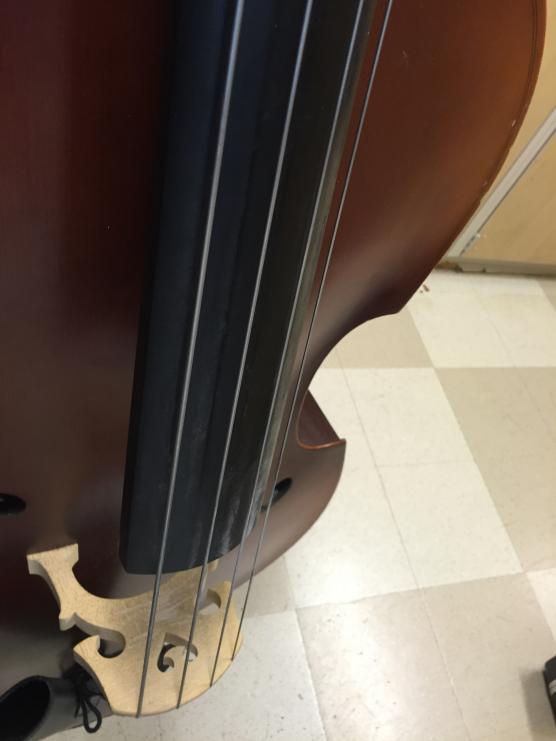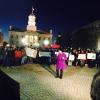To Whom It May Concern,
As a child going through the Norwalk Public School System, I struggled with more than just academic courses; I was bullied by my peers because of my weight. You can imagine what went on in my head going to Nathan Hale Middle School as a young adolescent and being made fun of by other students, and then having to sit through classes that I struggled in or did not particularly care for.
I was never considered to be a strong or highly intelligent student. I did really well in English, and was considered average in my academic classes such as Social Studies and Science. Math was something I particularly struggled with. It was a difficult subject for me and I never really liked it that much.
That’s where music came in.
I am an alumnus of the Norwalk Public Schools Music Program. Since I was very young, Norwalk has upheld one of the finest reputations for its music programs. The Norwalk High School Marching Band has won countless competitions, inspiring thousands upon thousands of children; the spectacular Candlelight concert that has gone on since before World War 2 draws back alumni from generations for three unforgettable nights of holiday music; the annual Spring Musicals that are comparable to Broadway performances. These are all spectacles of achievement for this wonderful city, and for children like me who struggled in their academics and social life, music was a beacon of light and hope.
According to a BOE member, they chose to make “the least painful” cut. Really? Let’s see how this least painful cut affects our children.
In order for students to learn how to play orchestra and band instruments, they need smaller individualized instruction. Typical ensemble classes range from 20-60 in Norwalk. If teachers are to reach every student and make sure they are successful, small group lesson instruction is necessary to differentiate and provide an intervention. How is this supposed to occur in a classroom of 20-60 adolescents? Simple: it will not. Students who require additional support will fall behind, and the quality and integrity of this thriving music program will fall apart.
Let me clarify what exactly will happen to the legacy of the Norwalk Public School’s Music Program should the middle school lesson group program be permanently cut. After receiving the necessary instruction string students require at the elementary level, they would move on to the middle school program where instruction on their instrument would basically cease. They will enter being able to play grade 1-2 string orchestra music because of their elementary instruction, but without middle school lessons they will not progress and will plateau.
Because our band students do not begin instruction on their instruments until sixth grade, they will never receive small group instruction. In large classrooms with many students of varying learning abilities, these children will be lucky if they barely finish an initial beginning methods book by the time they leave middle school, which is typically completed by students within their first year of study.
Our successful marching band, which has won national competitions, awards, and fostered thousands upon thousands of inner city Norwalk children and encouraged them to work as a team and strive for excellence, will be gone within two years. Those children will have never received the necessary instruction they required to be successful.
The pit orchestras for our outstanding musicals will fall apart. The professional level music that accompanies the shows produced at the high schools, will be inaccessible to our students. They will have never received the necessary instruction they required in order to advance to that level.
Norwalk’s Candlelight concert, the oldest continuing holiday concert in America, proudly showcases the high school’s entire music department and is essentially the epitome of this program. The quality and the essence of this wonderful annual concert tradition will perish.
Other traditions that we can bid farewell to here in this beautiful city is Norwalk’s annual All City String Concert, featuring students from grades 5-12, winter and spring concerts at the middle schools, and concerts like the Jazz Footpath Café at the high school
These excellent and wonderful traditions here in Norwalk will be destroyed because we are robbing our children of three years of music instruction. Have you considered the negative impact this will have on the Norwalk community? In this city, we pride ourselves on our arts education and these wonderful long-lasting traditions. Longtime residents will be devastated and our society will forever change.
Keeping in mind that Norwalk is a blue-collar community and is culturally and demographically very diverse, there are many students that would not be able to afford outside instruction to make up for the instruction lost within their schools. I would not have been able to get into my college’s music program without in-school lessons because my parents did not have the money for me to study privately.
The BOE is essentially proposing to extinguish an entire program here in Norwalk in order to cut “two music teaching positions?” How can this be possible? The BOE would like us to believe they are simply getting rid of middle school pull out lessons; in actuality, they are cutting the legs off a table. By eliminating the foundation of this program, which lies within Norwalk’s elementary and middle school music programs, they are destroying what makes this program special, unique, and strong.
If destroying legendary musical traditions here in Norwalk is not enough to convince you how devastating this cut could be for the program, then perhaps the impact on music for our children might. Students feel safe and happy in their instrumental music classes. Band, Orchestra, and Chorus is the one place students can go where they feel protected and can have fun. Our children are burdened by the stresses of academic classes for the majority of their school day. In their music classes, they can let themselves go and proudly make mistakes and not feel like they are failing. They learn teamwork, perseverance, and feel pride and accomplishment in themselves. By taking away their instructional time, we are asking our students to comfortably get up on stage and perform for the public. Will our beginning band students feel proud at their first winter concert performance when they can barely make a sound on their instruments, a skill typically taught and mastered during the first three months of instruction? Our students will feel embarrassed and will quit. We are setting them up for failure.
To Dr. Steven Adamowski, the superintendent of Norwalk Public Schools and the person who should proudly stand by this amazing program and the work these fine teachers do for these kids, I am shocked you have not rallied against this cut. That you pride yourself on “building a school district of excellence for the 21st century” is truly debatable. If this cut occurs, you are allowing the destruction of a legendary program that has fostered countless children in Norwalk.
To the Norwalk BOE member who wrote the following to a concerned parent: “The middle school private lessons disrupt instructional learning and we wanted to put a halt to the pull outs. Our first order of business is to teach kids how to add, read and write. That’s our core business,” I now speak to you directly. You obviously never had any music instruction, and I pity the fact that you can idly make a comment like this. If I may clarify this for you, the middle school lessons in Norwalk ARE instructional learning time for these students. They are typically done in small groups and are not private unless the instrumental difficulties or participation number warrant the need.
You further state that your first order of business is to teach kids how to add, read and write, which again clarifies to me that you definitely never had any musical instruction. Music encompasses ALL of these fields. Our students are using their brains to coordinate their fingers, hands, feet and even tongues to rhythmically play at precise moments in time. Given only a simple beat, students are reading symbols that can be traced back to the early 14th century and in their brains, are quickly subdividing those quarter notes into eighth notes, and dotted eighth notes, and sixteenth notes and thirty second notes. They are adding quarter notes to create half notes, and dotted half notes, and whole notes. They are doing so many things with their bodies and brains. They are doing math!
You want our students to develop literacy skills such as reading and writing. Our students are studying and playing music with directions written in Italian. In order to learn what those words mean, they annotate their music and develop a wider (and unique) range of vocabulary terms. When they make mistakes during lessons, they write notes and directions to themselves and learn from their mistakes. Music is also a foreign language in and of itself, but students are not just reading left to right: they are reading up and down (when the notes change); they are reading how to play the notes (articulations); they are playing those notes a certain way (tempos); they are playing those notes at a certain volume (dynamics). Finally, they are musically connecting their prior knowledge and making the music extremely personal for themselves, phrasing it a certain way and making it apart of their inner self. They share that passion with the listeners at concerts.
Music was the one place I could escape to at Nathan Hale when everything else seemed to be falling apart in my life. I loved going to Orchestra, but I enjoyed my lessons because that was where I really learned how to play the cello. I graduated from Norwalk High School in 2009 where I received the Outstanding Music Student Award, and I went on to receive my music education degree at Western Connecticut State University. I have since been teaching Orchestra in Westport, CT, where I am able to share my love and passion for music, qualities that were instilled in me through Norwalk’s successful program. Because of Norwalk, I am the person I am today.
To not see the value of what music can do for a child is sad and disappointing. When this program is gone, what happens to the students who were like me? What happens to the child who struggles to read English but can read music, the child who cannot do math but can play in time, the child who has no friends but is apart of his ensemble’s community? It is easy to cut a program, but once this program is cut, I fear we can never recover it.
To my fellow Norwalk music alumni, parents of alumni, current parents of music students, and current students in the program, I strongly urge you to rally against the BOE decimating this program – “our” program, before their vote on Tuesday, June 20th. There are children in our elementary schools who saw the Spring Musical, and who saw those students performing in the orchestra, and whose eyes widened with excitement, and whose hearts will break when they realize they will never be able to experience that.
To Dr. Steven Adamowski and the BOE, I implore you to consider what this cut could do to music in Norwalk and to our children. Music education is a vital and essential part of their lives, and they deserve to have it touch their hearts as it did to mine and countless others.
Sincerely,
Anthony Granata
NHS class of 2009
Norwalk Public Schools Music Department Alumnus
Graduate of Western Connecticut State University
Fairfield University Graduate Student
Orchestra Teacher, Westport, CT
















